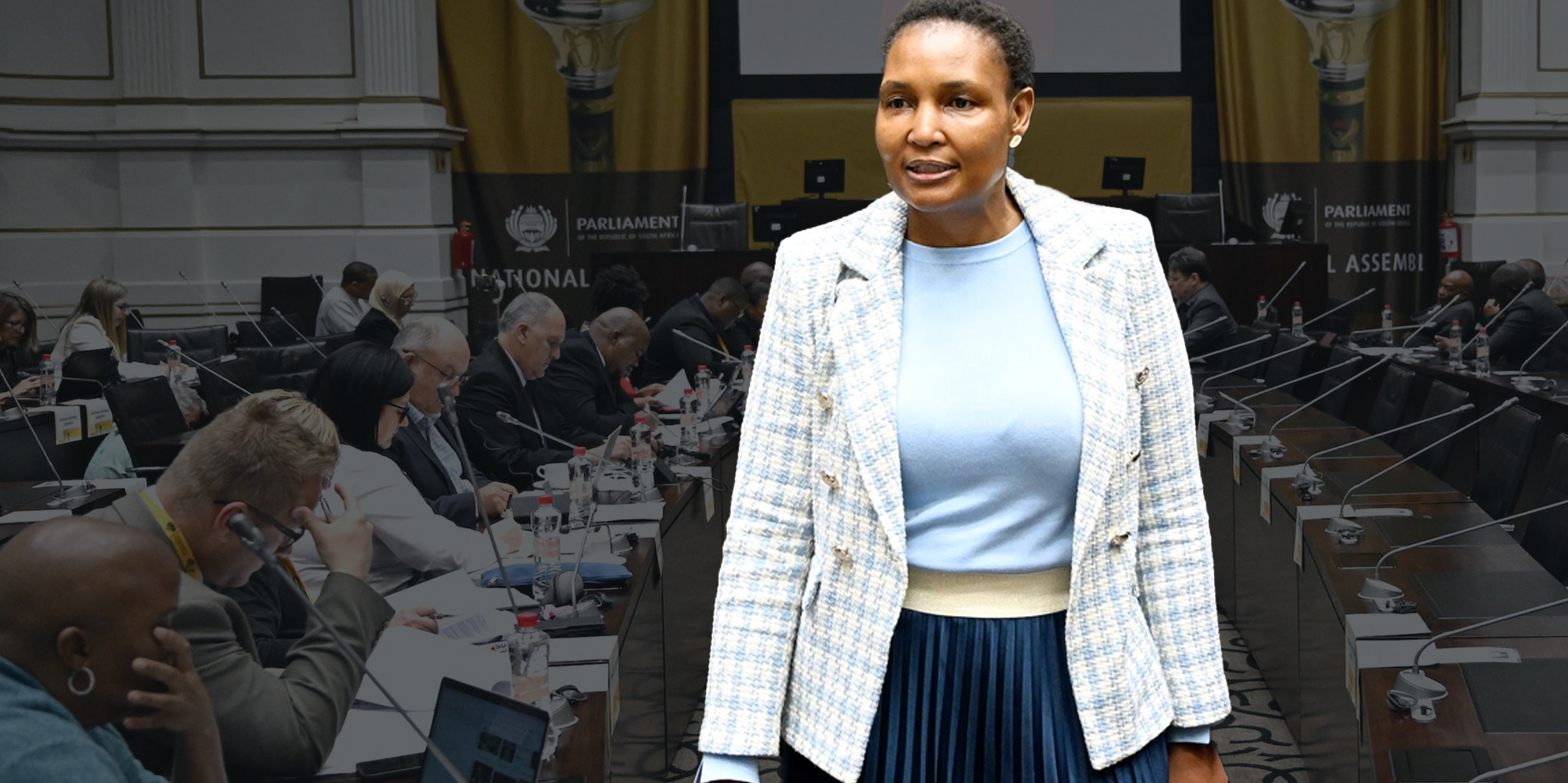Thembi Simelane, the justice minister since June, has misled Parliament in trying to explain a R575,600 loan she obtained from VBS corruption accused fixer Ralliom Razwinane in 2016.
A fact-check of her statements before the portfolio committee for justice and constitutional development on 6 September, which she voluntarily attended in an effort to clear her name, has revealed a raft of inconsistencies and false and misleading statements.
Background
Simelane told the committee that she had no improper relationship with Razwinane or his company, Gundo Wealth Solutions. Gundo was appointed by the Polokwane Municipality to provide investment brokerage services for a period of three years in March and April 2016.
Between 16 September 2016 and 5 May 2017, Polokwane invested R349-million in five transactions with VBS and withdrew its money between 16 March 2017 and 3 July 2017, earning R12.7-million in interest.
Polokwane Municipality was one of only a handful of the dozens of municipalities that invested with VBS that received all its money back.
Simelane claims that on 30 September 2016 she signed a loan agreement with Gundo to purchase a coffee shop in Sandton. She told MPs that she paid back the loan in three payments in October and November 2020 and a final payment in January 2021, totaling R849,000.
Since the publication of the existence of the loan by Daily Maverick and News 24, Simelane has steadfastly maintained there was no conflict of interest then – between Gundo being a service provider to Polokwane while she was mayor and getting a loan from them – or now – with her oversight of the National Prosecuting Authority that is pursuing cases against dozens of VBS fraud and corruption accused persons and companies.
Last week, Daily Maverick and News24 revealed that the loan agreement between Simelane and Razwinane was likely backdated, based on discrepancies in the wording of the document and source information about the timing of its first surfacing in 2020, weeks after the Hawks started asking for documents from the Polokwane municipality.
Read more: Revealed: Simelane’s VBS-linked coffee shop ‘loan agreement’ likely backdated
An examination of her opening statement and responses to MPs’ questions, as well as a written report Simelane provided to the committee, reveal discrepancies.
Some of the most significant misleading statements and claims revolve around the timeline of the various transactions.

The first two investments by Polokwane with VBS were made on 16 September 2016 (two weeks before she claims the loan agreement was signed) and on 7 October 2016 for R30 million and R50 million, respectively.
Gundo was paid R1.4-million in kickbacks by VBS, disguised as commissions, for these two investments and Razwinane is facing corruption charges linked to these two separate payments in the main VBS trial.
The payments for Silvanas Coffee Shop were made on 14 and 17 October 2016 by Gundo, with money directly linked to the VBS kickbacks for the two Polokwane investments. Simelane’s false claim may be aimed at avoiding the damning timing of the transactions.

This is a central tenet of Simelane’s argument in that she claimed because Gundo was not being paid by Polokwane Municipality for its work brokering the investments, there was no conflict of interest and she was able to take the loan from Gundo. The existence of a contract and service level agreement, a procurement process and approvals prove this version is false.

An investigation by BDO, a forensic accounting firm, commissioned by the Limpopo provincial treasury found that all of Polokwane’s investments with VBS – five separate transactions were all withdrawn after the date the investments were initially agreed for.
Four investments were for 180 days and were withdrawn between 182 days and 192 days later. The final investment was meant to be for 45 days and was withdrawn 58 days later. This makes it clear the investments were allowed to sit for the full term, with no intervention from any Polokwane official to withdraw the funds earlier.

Four of Polokwane’s investments were withdrawn prior to National Treasury issuing a communiqué on 15 August 2017 instructing all municipalities to desist from investing with VBS. The largest of Polokwane’s investments, R95-million was placed with VBS on 24 March 2017 and withdrawn 187 days later on 26 September 2017 – weeks after the National Treasury notice.
But this belies the foundational problem that Simelane and all other municipal officials faced – investment in a mutual bank, such as VBS was not permitted. On 24 June 2016, an official at Polokwane municipality confirmed this, according to emails found by BDO.

VBS Mutual Bank went under in March 2018 and Limpopo provincial treasury commissioned forensic accounting firm, BDO, to provide a report on all investments made with VBS by every Limpopo municipality. The BDO report was finalised a year later, in March 2019.

On Simelane’s own version, the loan agreement with Gundo called for repayments to start in September 2020 – exactly four years after the loan was paid. This was, she later told MPs, to allow her time to establish the business and pay off an additional R232,000 to the previous owners, amounts that Gundo apparently could not cover in the initial loan. But the BDO report was already finalised in March 2019, the firm having started its work in 2018.

While it is possible Simelane only saw the BDO report for the first time on 9 October 2020, it was finalised in March 2019. However, on 9 October 2020, Limpopo treasury wrote a letter to Polokwane Municipality asking for information on the implementation of the BDO report recommendations – suggesting the report was handed to the municipality well before 9 October 2020. It seems highly improbable that the report would not have been handed to the municipality’s mayor.
The report recommended various steps against Polokwane officials, but also found that Simelane had violated the Municipal Finance Management Act (MFMA). Later in her appearance before Parliament, she said her sanction was to attend a two-year course on the MFMA at a university.

Simelane’s statement contradicts the terms of her purported loan agreement with Gundo. At the time of BDO’s forensic investigation, the loan was not due for repayment for another two years. It is improbable that she held this view at the time.
BDO interviewed Simelane, but from the content of the firm’s report, it seems she never disclosed her “loan” with Gundo. It is an odd omission, considering that, on her version, the repayments were so front of mind that she did not want to do it “quickly, quickly” and attract attention.
A letter from the Hawks official investigating Polokwane’s investments with VBS is likely the trigger that not only forced Simelane and Razwinane to draw up a loan agreement years after money changed hands, but also why Simelane had to start paying back the “loan”, Daily Maverick and News24 investigations previously revealed.
When pressed, Simelane had to admit to parliamentarians that she did not disclose the Gundo “loan” to municipal council, either - ostensibly because the declaration form had no section allowing such declaration.

The BDO investigation found that the policy did not provide for the appointment of an investment manager or broker. Also, Gundo was appointed on 4 March 2016, signed a service level agreement on 4 April 2016 and the appointment was approved by the chairperson of the bid adjudication committee on 14 April 2016.
It remains unclear why the services of an investment broker were needed by Polokwane Municipality that had previously conducted its own investment transactions. Simelane also contradicted herself about the appointment of Gundo, at one point saying it was an unsolicited bid, but later said a procurement process had unfolded that resulted in Gundo’s appointment. She failed to specify if the municipality went out on a normal tender, or after receiving an unsolicited bid from Gundo, ran a competitive tender process that resulted in their appointment. A Paia application requesting documents from the municipality to establish the facts around the appointment has yet to be responded to.

Section 4(c)(ix) of the regulations make no mention of administration fees or other fees but regulates what an investment policy of a municipality must include. In (ix), the regulations stipulate that any policy must in the case of an investment manager being used set out the “conditions for their use, including their liability in the event of non-compliance with the policy or these regulations”.

Daily Maverick and News24 reflected the minister’s version that the money was a loan that she had paid back in full clearly - but called into question the conflict of interest and rationale of the transaction. DM





